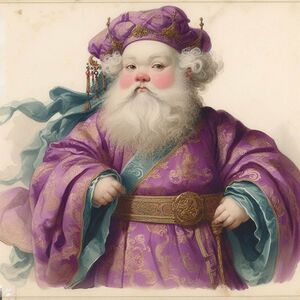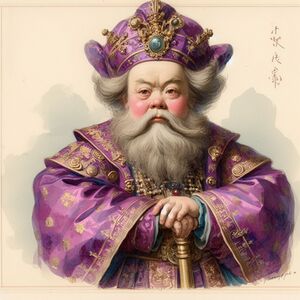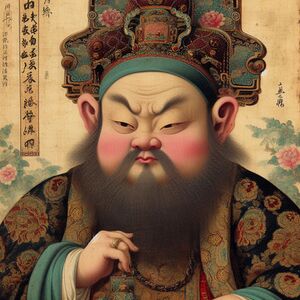Master of Tongues

The Master of Tongues (恶魔音箱) was the chief interpreter to the imperial court of Daxia. The position was first created during the Shang dynasty and persisted through the Chen, Zhong and Qian periods. The Master of Tongues was a very important functionary and was one of the chief aides to the ministers in charge of foreign affairs. In Daxian idiosyncrasy the speaking of foreign tongues was considered disgraceful and unbecoming of a proper Daxian, therefore the task of acting as interpreters fell to foreigners. These were usually former slaves bought, received as tribute or captured from enemy territories. Most of the early royal interpreters were of Muslim origin due to the Chen dynasty's frequent interaction with former Oduniyyad polities and a handful of Muslim families monopolized the position for decades. As Daxia turned its sights to the east, the prominence of Muslim interpreters came to an end, replaced most frequently by Sarpedonians and Levantians in the position. The taboo on native Daxians learning other languages gradually faded away and foreigners were employed less frequently during the late imperial period. During the Qian dynasty many of those who rose to the position were also dwarfs or Jews.
History
The existence of royal interpreters in the courts of Daxia is documented as far back as the Xie dynasty. The Shang dynasty employed a position called the Grand Speaker whose duties were near identical to the Master of Tongues, the key difference being the Shang did not employ foreigners for the position. The position of Master of Tongues was not only the interpreter of the Emperor and other high officials, he was also an important functionary in the conduct of foreign affairs, being usually the assisting second and scribe to the Grand Secretary during negotiations with foreign powers. The Master of Tongues was also the overseer of all interpreters in imperial service. In time the successive Master of Tongue officeholders managed to transform the position and carve a full career path to it. The navy and the army had their own Master of Tongues and service in those positions for at least ten years was one of the requisites to aspire to the higher posting. The Master of Tongues had to know at least three languages in addition to Daxian, these usually were Arabic, Metzi and Latin. During the Qian period greater emphasis was placed on acquiring a working knowledge of Coscivian and Burgoignesc, the languages of the Qian's closest competitors. Julian Ænglish was not considered an important language for the job until the early 20th century. The Master of Tongues did not serve for a fixed amount of years, his permanence in the post was entirely dependent on being of continued use to whoever appointed him. Sometimes the intriguing could end in the execution of the Master of Tongues but the normal destiny was a comfortable retirement, sent overseas as an ambassador or an upgrade to ruler of one of the Rusanan vassal taifas.
The last emperor of the Shang dynasty, Cai Leng, issued the edict of prohibition on speaking foreign languages by his Daxian courtiers; he reportedly did this out of paranoia and so they wouldn't betray him to foreign powers. Concurrently he created the position of Master of Tongues and appointed a polyglot from Rusana named Attar al-Badri, al-Badri's foreign background and lack of local ties or contacts made him totally dependent on the Emperor's continued patronage and thus made him a safe choice. Attar al-Badri continued to serve the new Chen dynasty after Cai Leng's ultimate betrayal at the hands of his own guards. During his tenure of fifteen years, Attar al-Badri took the time to groom his eldest son to one day succeed him, starting a long period of dominance of the position by Muslims from al-Badri's and a few other Muslim families. The al-Badri family was only dislodged from their position after some sixty years thanks to hefty bribes and deft intriguing by the Master of Tongues of the navy, the eunuch Rabi el-Saab.
Privileges

The Master of Tongues began as a posting that operated in very austere conditions, the usual foreign backgrounds of the title holders put them at a disadvantage at court. Attar al-Badri reputedly was assigned a small, dinky cell with a straw bed and was given five candles per month, one for each week and one extra. His grandson Munir al-Badri leveraged his good standing with the Grand Secretary to be moved to more spacious accommodations, he also began to demand a fifth of the salary of every interpreter that worked under him and later charged a bribe for appointments. During the Qian dynasty the Master of Tongues was a position exempt of taxes after fifteen years of service, they were allowed to wear ornate robes of many colors and hats of office, they were assigned a palanquin of their own and could also keep slaves as part of their personal property. The official annual salary of the Master of Tongues was 30,000 imperial lire but that figure ballooned due to all the bribes and other shady incomes it could extract from underlings and commission work they would do on the side.
Beginning in the 17th century it became customary for a retiring Master of Tongues to be appointed to rule over one of the vassal taifas in Rusana. Ethnic Daxian overlords had fared poorly with the natives in the past and once again the outsider status of a former Master of Tongues was perceived as useful in interactions with the Muslim population. The position of Imperial Viceroy was a significant upgrade in material conditions and prestige. Viceroys had their own palaces and security retinues and much larger yearly salaries, according to records the Imperial Viceroy of Ghanim was paid 85,000 imperial lire per year. Not to mention the posting came with myriad opportunities to engage in graft and corruption. Imperial Viceroys were also customarily ennobled after the end of their time in office, a powerful incentive to rule their domain well and keep its productivity up and taxes flowing to the treasury.
Notable officeholders
Apito Tomtor

Apito Tomtor was born in 1660 in Taigovæloa, Sarolasta to a family of Coscivian peasants. Born with dwarfism his parents kept him despite the burden he could represent, not being able to help much with farm work. In 1664 Sarolasta came under attack by the Daxian force of Zhu Bolin during the Siege of Dun-Kurrengev. Taigovæloa itself was sacked by the corsair auxiliaries of Luidan Răzvala Saminian Dovinofo and Tomtor's family was slain. The four year old Apito was seized as a captive by the raiders and was taken along with them back to Daxian waters when Zhu Bolin's fleet retreated from the island. Apito served with Dovinofo's corsairs for four years as a cabin boy and jester before escaping them while on the port of Zong. The conspicuously young and white skinned dwarf was quickly apprehended and sold to agents of the imperial palace. The young dwarf was inducted into the palace school and educated in Daxian history, languages and statecraft under the watchful tutelage of Ronan Hill, the Urcean-born Master of Tongues to Emperor Tengu the Sot. Upon graduation he was posted to the island of Zhijun to serve as the governor's interpreter in his trade dealings with Caphirian's and Pelaxians. As a fluent Coscivian speaker he traveled to his native Sarolasta during this time to help negotiate the import of Sarolastan hemp.
He was recalled to Mirzak after six years and appointed as Deputy Recording Secretary of second rank at the Secretariat of the Navy. During his time with the Secretariat he was deeply involved in negotiations with foreign shipbuilder guilds to acquire their expertise for the expansion of the Qian navy. From 1691 to 1705 he served as the Master of Tongues of the Navy and was stationed with the Harmonious Flotilla Invincible, being part of its strategy councils and being present at fleet actions during the Daxian Polynesian Wars as well as participating as the interpreter in various siege negotiations, exchanges of prisoners and arrangement of truces. He was elevated to Master of Tongues in 1706 by Emperor Hanleng and served in that position until his semi-retirement in 1721. He was brought out of retirement in 1723 to serve as Imperial Qian ambassador to the court of the Marble Emperor and in this capacity helped negotiate the Truce of Caserges that ended the Daxian Polynesian Wars. During his time in Kiravia he donated to many causes that advanced the welfare of the native mùgorikuv, who he considered his brethren. Apito Tomtor died peacefully in his sleep in 1748 after 25 years of diplomatic labor in Kartika.
Talebot laFitte

Talebot-Fouet Ratusi Jacquinot was born on April 8th, 1694 to a Bergendii boswain's mate, Damian-Arnaud Guibault Jaquinot and his Loa wife, Ratu, in the village of St. Sebastian, on the island of Catavis, Equatorial Ostiecia. He was always of diminutive stature and was teased for it mercilessly by other children in the settlement. He was known as a momma's boy, from his mother he inherited a sharp wit, and broad intellect. He grew up speaking Burgoignesc, Loa, and the Latino-Carib creole language of the native Oustec. At 12, he joined his father on a voyage to Veraise Colony and was immediately prized by the captain, Henri-Elsmere Rembrandt laFitte, for his intelligence, his small stature, and his willingness to please. The captain paid Talebot's father a portion of his profit-share in Veraise Colony and adopted Talebot as his own. He established Talebot, now Talebot-Fouet Jacquinot laFitte, with a private tutor in the Duchy of Bourgondi from 1708-1712, and upon his 18th birthday he was commissioned by the duke as an under-captain (Burg: sous-capitain) on a ship in a merchant/colonization fleet bound for the newly established Sud Moll colony. Every thing was going to plan until, almost at their they came under attack from a Daxian fleet patrolling the waters around their colonial possession of Stenza. Talebot's ship and the four other warships broke off to give the unarmed ships an opportunity to flee. The Daxian fleet consisted of 8 warships, many of them massive Zhàn Chuán which would have decimated the Duchy of Bourgondi's ships. In the initial moments of the engagement the captain of his ship was killed by shrapnel and Talebot took command. He told his crew to disengage which they resisted thinking he was deserting. He had seen some of the smaller Daxian ships give chase to the unarmed ships of the fleet and he was determined to defend them. Every one of the other Bourgondii ships were completely decimated and sunk, eventually, but Talebot's actions saved the merchant ships. His ship was captured by the Daxian fleet but it bought time for the merchant ships to get far enough away from the Daxians that they made it to Sud Moll colony without any further harassment. Based on some contemporary accounts, based on archeological evidence and diary writings from the time, it is thought that the colonization effort on Sudmoll was destined to fail, prior to the arrival of fresh materials, food, and settlers.
After being captured, the crew of Talebot's ship were brought to Stenza and impressed into service in the Daxian navy. Talebot quickly rose through the ranks again and became a captain within 2 years and served bravely in the latter years of the Daxian Polynesian Wars, during that time he became fluent in Daxian. His ability with languages was recognized by the admiral he served and he was the translator at the final peace negotiations. After this, he was apprenticed to Apito Tomtor, the Master of Tongues. He served Apito Tomtor, attended the palace school for years, and went on many expeditions to learn new languages. From 1730-1737 he travelled across Daria to learn Arabic, Umardi, and Pukhti, but also to be a spy for the court of Qian. He came back and impressed the court and was eventually made the Master of Tongues in 1743 when his predecessor retired. He served as the Master of Tongues from 1743 to 1752 when he was offered a posting as the Imperial Viceroy of Ghanim. He led Ghanim with an iron fist, but invested heavily in educational infrastructure in rural areas in the hopes of creating opportunities for talented youth like himself. This has left a legacy of exceptional educational investment in some remote villages in modern Ghanim, called Talebot-madrassas.
Dorgon the Black

Dorgon the Black is an infamous dwarf who rose from obscurity to become the court favorite and Grand Vizier of the penultimate Zhong Emperor, Huichen. The very archetype of the evil counselor, Dorgon's power and authority grew great enough to overshadow his patron, whose death he ordered when the Emperor sought to contain the dwarf. Huichen's death unleashed a civil war that ended with the implosion and collapse of the Zhong and the rise of the Qian dynasty.
The dwarf known to history simply as Dorgon was born, according to the scant bibliographical evidence that was not destroyed upon his orders, either in 1280 or 1278 of the Zhong era, which are the conflicting years that are recorded for his sale to the Palace. He is of unknown parentage and his given name was Mu, Dorgon being a princely name bestowed upon him later in life. He was raised as one among dozens by the Matron of the Warren and was noted by a quick intellect and a penchant for casual brutality against other kids. The Matron decided to pass him over to the Palace school for training instead of sending him down the servant route. As a dwarf and no natural warrior, he was trained to be a bureaucrat, learned in mathematics, law and governance. He served ably and efficiently as Keeper of Accounts on the palace's eastern wing, revealing a web of corruption and petty theft ran by court eunuchs.
Radzig Wohlbacher
See also